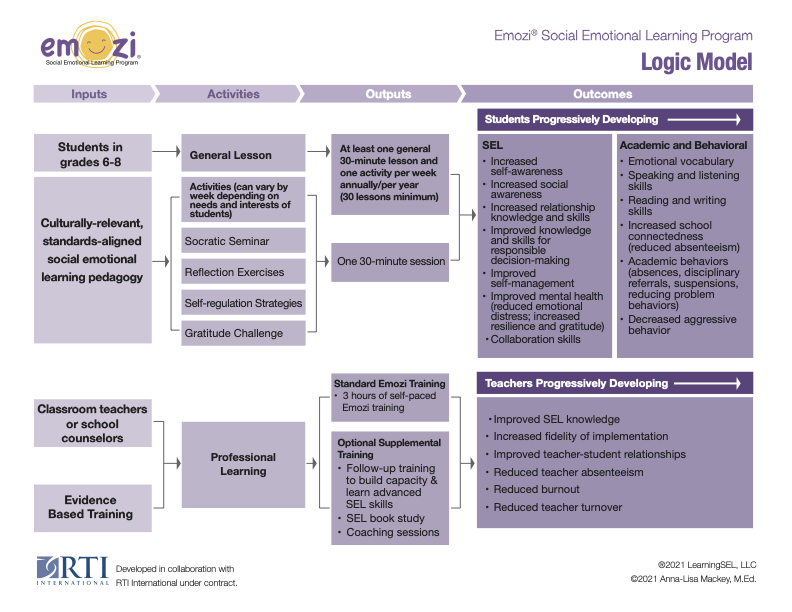Emozi® Curriculum Research
Research-Informed and Culturally Relevant
Emozi® is a comprehensive social emotional learning program that draws from decades of research into SEL, the latest scientific studies on emotions, effective pedagogical strategies for middle and high school students, and best practices for teaching culturally relevant curriculum.
RTI Occasional Paper on SEL
Social Emotional Learning In Middle School: Developing Evidence-Based Programs
Pilot Study Outcomes
In a small exploratory study of students’ SEL outcomes, independent researchers observed meaningful improvement in DESSA-Mini pre-and post-test scores for students who participated in Emozi®. Both teachers interviewed reported that because of Emozi® Middle School, their own understanding of SEL improved as did their relationships with their students.
Review of Research
Emozi draws from past and current research to provide a meaningful framework for educators. Read more by downloading the white paper.
Works Cited
Barrett, L. F. (2017a). The theory of constructed emotion: an active inference account of interoception and categorization. Social Cognitive and Affective Neuroscience, 12(1), 1–23.
Barrett, L. F. (2017b). How Emotions Are Made: The Secret Life of the Brain. Houghton Mifflin Harcourt.
Barrett, L.F. (2020 November 23). Your brain is not for thinking. The New York Times. https://www.nytimes.com/2020/11/23/opinion/brain-neuroscience-stress.html
Barrett, L. F., Adolphs, R., Marsella, S., Martinez, A., & Pollak, S. D. (2018). Emotional expressions reconsidered: challenges to inferring emotion from human facial movements. Psychological Science in the Public Interest: A Journal of the American Psychological Society. http://eprints.gla.ac.uk/178385/
Bartlett, M. Y., & DeSteno, D. (2006). Gratitude and prosocial behavior: Helping when it costs you. Psychological Science, 17(4), 319–325.
Claro, S., Paunesku, D., & Dweck, C. S. (2016). Growth mindset tempers the effects of poverty on academic achievement. Proceedings of the National Academy of Sciences of the United States of America, 113(31), 8664–8668.
DeSteno, D., Bartlett, M. Y., Baumann, J., Williams, L. A., & Dickens, L. (2010). Gratitude as moral sentiment: emotion-guided cooperation in economic exchange. Emotion, 10(2), 289–293.
DeSteno, D., Duong, F., Lim, D., & Kates, S. (2019). The Grateful Don’t Cheat: Gratitude as a Fount of Virtue. Psychological Science, 30(7), 979–988.
DeSteno, D., Li, Y., Dickens, L., & Lerner, J. S. (2014). Gratitude: a tool for reducing economic impatience. Psychological Science, 25(6), 1262–1267.
Dickens, L., & DeSteno, D. (2016). The grateful are patient: Heightened daily gratitude is associated with attenuated temporal discounting. Emotion, 16(4), 421–425.
Domitrovich, C. E., Durlak, J. A., Staley, K. C., & Weissberg, R. P. (2017). Social-Emotional Competence: An Essential Factor for Promoting Positive Adjustment and Reducing Risk in School Children. Child Development, 88(2), 408–416.
Durlak, J. A., Weissberg, R. P., Dymnicki, A. B., Taylor, R. D., & Schellinger, K. B. (2011). The impact of enhancing students’ social and emotional learning: a meta-analysis of school-based universal interventions. Child Development, 82(1), 405–432.
Froh, J. J., Emmons, R. A., Card, N. A., Bono, G., & Wilson, J. A. (2011). Gratitude and the Reduced Costs of Materialism in Adolescents. Journal of Happiness Studies, 12(2), 289–302.
Garland, E. L., & Howard, M. O. (2018). Mindfulness-based treatment of addiction: current state of the field and envisioning the next wave of research. In Addiction Science & Clinical Practice (Vol. 13, Issue 1). https://doi.org/10.1186/s13722-018-0115-3
Heath, M. A., Smith, K., & Young, E. L. (2017). Using Children’s Literature to Strengthen Social and Emotional Learning. School Psychology International, 38(5), 541–561.
Hébert, T. P., & Kent, R. (2000). Nurturing social and emotional development in gifted teenagers through young adult literature. Roeper Review, 22(3), 167–171.
Hoemann, K., Xu, F., & Barrett, L. F. (2019). Emotion words, emotion concepts, and emotional development in children: A constructionist hypothesis. Developmental Psychology, 55(9), 1830–1849.
Hölzel, B. K., Hoge, E. A., Greve, D. N., Gard, T., Creswell, J. D., Brown, K. W., Barrett, L. F., Schwartz, C., Vaitl, D., & Lazar, S. W. (2013). Neural mechanisms of symptom improvements in generalized anxiety disorder following mindfulness training. NeuroImage. Clinical, 2, 448–458.
Jha, A. P., Morrison, A. B., Parker, S. C., & Stanley, E. A. (2017). Practice Is Protective: Mindfulness Training Promotes Cognitive Resilience in High-Stress Cohorts. Mindfulness, 8(1), 46–58.
Kaplan, M., Silver, N., LaVaque-Manty, D., & Meizlish, D. (2013). Using Reflection and Metacognition to Improve Student Learning. Stylus Publishing, LLC.
Kashdan, T. B., Barrett, L. F., & McKnight, P. E. (2015). Unpacking Emotion Differentiation: Transforming Unpleasant Experience by Perceiving Distinctions in Negativity. Current Directions in Psychological Science, 24(1), 10–16.
Kates, S., & DeSteno, D. (2020). Gratitude reduces consumption of depleting resources. Emotion. https://doi.org/10.1037/emo0000936
Konrath, S. H., O’Brien, E. H., & Hsing, C. (2011). Changes in dispositional empathy in American college students over time: a meta-analysis. Personality and Social Psychology Review: An Official Journal of the Society for Personality and Social Psychology, Inc, 15(2), 180–198.
Lindquist, K. A., Wager, T. D., Kober, H., Bliss-Moreau, E., & Barrett, L. F. (2012). The brain basis of emotion: a meta-analytic review. The Behavioral and Brain Sciences, 35(3), 121–143.
Li, W., Howard, M. O., Garland, E. L., McGovern, P., & Lazar, M. (2017). Mindfulness treatment for substance misuse: A systematic review and meta-analysis. Journal of Substance Abuse Treatment, 75, 62–96.
Osher, D., & Berg, J. (2017). School climate and social and emotional learning: The integration of two approaches. Edna Bennett Pierce Prevention Research Center, Pennsylvania State University.
Savitz, R. S., Roberts, L. D., Ferrari, K., Jernigan, S., & Long, R. D. (2021). Young Adult Literature as a Means for Developing and Supporting Socio-Emotional Learning. In Handbook of Research on Supporting Social and Emotional Development Through Literacy Education (pp. 453–476). IGI Global.

